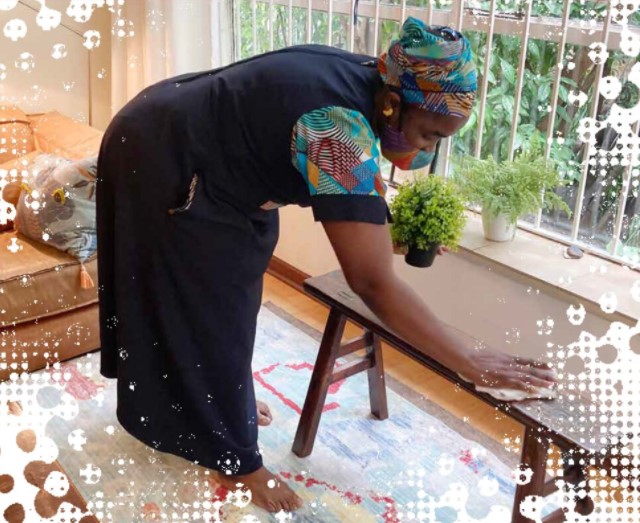
Feb 3, 2022
“The dignity of people’s very being is at stake,” said IZWI Domestic Worker Alliance’s founder and lead researcher Amy Tekie in opening remarks at a recent webinar focused on a new qualitative survey of human rights violations against live-in domestic workers in South Africa.

“Really awful things are happening behind closed doors,” said IZWI’s Amy Tekie.
“The Persistence of Private Power: Sacrificing Rights for Wages“—co-published by Johannesburg-based IZWI Domestic Workers Alliance and the Solidarity Center—surveys the constitutional and human rights of live-in domestic workers in South Africa. It describes how domestic workers’ rights to privacy, freedom of movement and children’s right to parental care are frequently sacrificed for wages in a sector underpinned by racism, sexism and classism. Resulting exploitation—largely invisible because of the private spaces in which it occurs—continues regardless of constitutional protections and industry-specific labor regulations.

We are expected to be indoors even when it is our off day,” said the survey’s lead field researcher Theresa Nyoni. Credit: IZWI
“We are not allowed to be seen around,” said the survey’s lead field interviewer, Theresa Nyoni, of a sectional title housing complex in which she was formerly employed as a domestic worker.
Nyoni described almost universally denied opportunities for live-in domestic workers in sectional title housing to enjoy open spaces on, or near, the employers’ property and lack of freedom to move around or receive visitors in their own quarters—even during off hours. And, for most live-in domestic workers, she noted invasive employer surveillance and almost total lack of privacy.
“We are sleeping with kids and not allowed to lock the door; parents barge into the room and even the bathroom,” she said.
Employers isolate domestic workers by routinely denying them visits from friends, spouses and children, and some domestic workers say they are not allowed to leave their employer’s home for any reason. Nyoni described her former employer’s refusal to allow her to leave the work premises, on her own time, to purchase and arrange for transportation of bulk food items to her own children during the pandemic.
“When I held a plate of food to eat, I was thinking: Did my children get food today?”
Survey interviewees outlined living conditions that Tekie described as “almost kidnapping [in its] constant and complete employer surveillance and control.” Besides being isolated from loved ones, many live-in domestic workers said they were denied employer permission to keep their infants with them, receive packages or use their employer’s kitchen to preserve and prepare their own food, and those employed in sectional title housing complexes reported repeated employer and security guard searches. Some live-in domestic workers said they have chosen abortions for fear of losing their jobs.
IZWI interviewed 115 mostly migrant live-in domestic workers for the survey, most of whom were working in or near Johannesburg—where working conditions are anecdotally better than those than in rural areas, said Tekie. Approximately half of South Africa’s more than 800,00 domestic workers live in by IZWI’s estimate, although definitive data does not yet exist, she said.
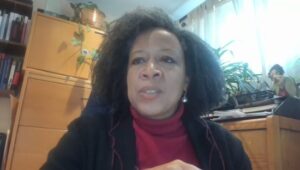
The survey affirms that state silence perpetuates the status quo, said McGill University Faculty of Law Professor Adelle Blackett.
McGill University Faculty of Law Professor of Transnational Labor and Development Adelle Blackett underscored the significance of the report being centered on the lived experience of domestic workers and the persistence of private power in their lives, even post-Apartheid.
Describing the report as “chilling,” Blackett defined the status quo for South Africa’s domestic workers as, “historicized, racialized, intersectionalized enslavement to domestic servitude.”

“[This report] is only the tip of the iceberg,” said former South African Labor Court judge Urmilla Bhoola.
“When domestic workers live in, they forfeit their rights,” she said. And so, civil society legal activism is essential, including that spearheaded by trade unions, she added.
Report recommendations include extension to domestic workers of many of the rights contained in South Africa’s farmworker Extension of Tenure Security Act (ESTA) but absent from Sectoral Determination 7 governing domestic work. ESTA guarantees to farmworkers residing on employers’ land “the right to human dignity”—including privacy, having family life, the freedoms of association, movement and religion, and to have visitors and receive postal communication.” Alternatively, concludes the report, legislation specific to the domestic work sector should be created that includes:
- Minimum housing standards for all live-in domestic workers, not only those paying rent
- Basic regulations on rights to family life and visitors, including the right for family to cohabit with a worker, within residential density laws, and the right for workers to have visitors in their homes
- Regulations to protect privacy, explicitly preventing employers from searching rooms, phones or property without permission
- Clear protection of a worker’s right to move freely during off hours
- Guidelines on bullying, harassment and assault, as those provided in the labor law do not address the specifics of the domestic sector
- Guidelines for provision of food.
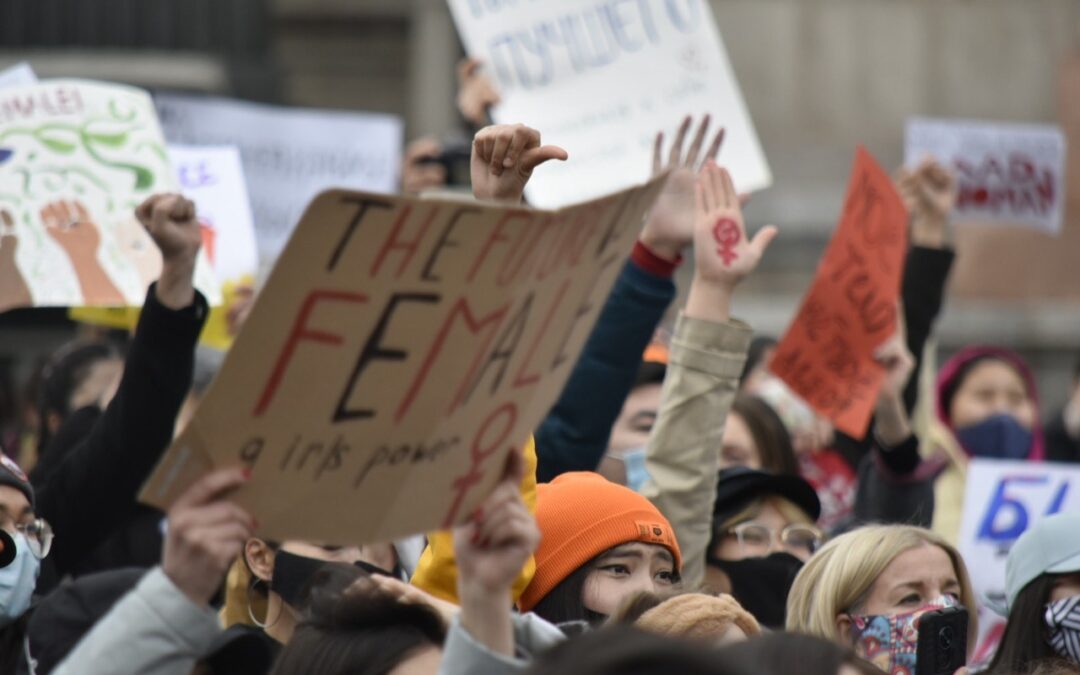
Nov 12, 2021
Победа в борьбе за гендерное равенство и равенство в оплате труда в бывшей советской республике Казахстан: в прошлом месяце эта страна отменила список рабочих мест, юридически недоступных для женщин с 1932 года. Такие дискриминационные списки, которые вынуждают женщин отказываться от более высокооплачиваемой работы в традиционно мужских секторах в пользу низкооплачиваемых профессий, в которых доминируют женщины, – типичны для данного региона, а также для Беларуси, Кыргызстана, России и Узбекистана.
Отмена данного списка в Казахстане стала возможной в результате многолетних усилий адвокации партнера Центра Солидарности – Казахстанского Международного Бюро по правам человека (КМБПЧ) на встречах, конференциях и других форумах с политиками и представителями правительства, включая Министерство труда и социальной защиты Республики Казахстан и Комиссию по правам человека при Президенте Республики Казахстан.
“В современном мире не должно быть дискриминационных ограничений на доступ к работе, и все люди сами имеют право выбирать, где и как работать”, – сказал заместитель директора КМБПЧ Денис Дживага.
Работа, в которой ранее женщинам было отказано, включала относительно хорошо оплачиваемые рабочие места в строительстве, металлообработке, горнодобывающей промышленности и нефтедобыче, в том числе: работы, выполняемые на высоте или под землей; квалифицированные строительные, дорожные и металлообрабатывающие работы, включая кладку, работу на землеройной технике, плавку руды, установку труб и сварку; а также специализированные работы в разведке и геодезии, такие как бурение скважин, установка вышек и прессование труб.
Международная организация труда (МОТ) уже давно призывает государства отменить списки профессий, запрещенных для женщин, учитывая их дискриминационное воздействие. Женщины в Казахстане, например, зарабатывают в среднем на 32 процента меньше, чем мужчины.
Список Казахстана, который ограничивал доступ женщин к более чем 200 профессиям на том основании, что работа была слишком тяжелой или опасной с физической точки зрения, был отменен после того, как правительство Казахстана признало в Комитете ООН по ликвидации дискриминации в отношении женщин (КЛДЖ), что запреты на работу способствовали неравенству в оплате труда мужчин и женщин. Комитет ООН по экономическим, социальным и культурным правам (CESR) рекомендовал Казахстану рассмотреть другие формы правовой защиты женщин, чтобы обеспечить их безопасность на работе, а не осуществлять полный запрет на доступ к определенным профессиям.
“Гендерное равенство и равенство в оплате труда требуют, чтобы мужчины и женщины имели равный доступ ко всем видам работы и чтобы все рабочие места были безопасными для всех работников”, – подчеркнул директор региональной программы Центра солидарности в Европе и Центральной Азии Руди Портер.

Nov 12, 2021
In a win for gender and pay equity in the former Soviet region of Kazakhstan, last month the country abolished a list of jobs from which women have been legally barred since 1932. Such discriminatory lists—which force women away from higher-paid work in traditionally male-dominated sectors toward lower-paid, female-dominated occupations—are common in the region, including in Belarus, Kyrgyzstan, Russia and Uzbekistan.
Abolition of Kazakhstan’s list came about after years of advocacy efforts by Solidarity Center partner Kazakhstan International Bureau for Human Rights (KIBHR) in meetings, conferences and other fora with policy makers and government representatives, including the Ministry of Labor and Social Protection of the Republic of Kazakhstan, and the Commission on Human Rights under the President of the Republic of Kazakhstan.
“In the modern world there should not be discriminatory restrictions on access to work and all people themselves have the right to choose where and how to work,” said KIBHR Deputy Director Denis Jivaga.
Among the jobs previously denied to women were relatively well-paid jobs in construction, metalwork, mining and oil extraction sectors including: jobs performed at-height or underground; skilled construction, road and metal-working jobs including masonry, ground-moving machine operation, ore smelting, pipe fitting and welding; and specialized work in exploration and surveying such as borehole drilling, derrick installation and pipe pressing.
The International Labor Organization (ILO) has long called on states to abolish lists of professions prohibited for women given their discriminatory impact. Women in Kazakhstan, for example, earn 32 percent less than men on average.
Kazakhstan’s list—which restricted women from more than 200 jobs on the grounds that the work was too physically demanding or dangerous—was abolished after the Kazakhstan government acknowledged to the UN Committee on the Elimination of Discrimination Against Women (CEDAW) that job prohibitions have contributed to gender-pay inequity. The UN Committee on Economic, Social and Cultural Rights (CESR) recommended that Kazakhstan consider other forms of legal protection for women to keep them safe at work rather than a total ban on access to certain professions.
“Gender and pay equity require that men and women have equal access to all types of work, and that all jobs be made safe for all workers,” says Solidarity Center Europe and Central Asia Regional Program Director Rudy Porter.
Read in Russian.
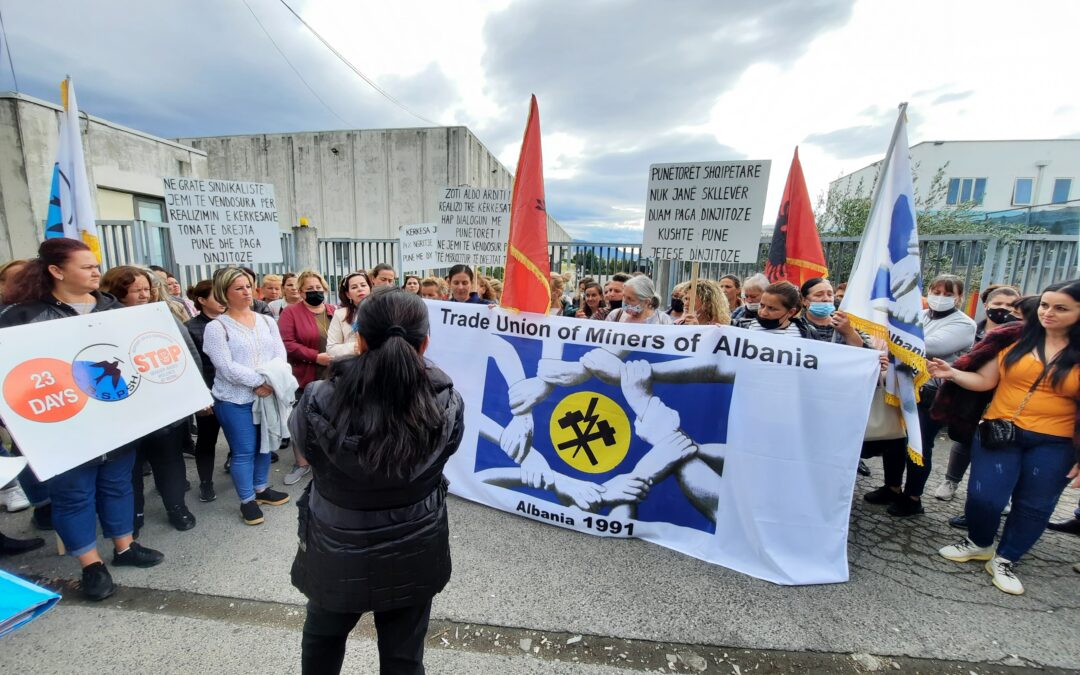
Oct 28, 2021
Last week, 125 women improved their wages and working conditions through a new negotiated agreement with an Albanian subsidiary of an Italian multinational lighting company. The agreement, which ended a 15-day work stoppage, was supported by Solidarity Center Albania union partners Bashkimi i Sindikatave te Pavarura te Shqiperise (BSPSH) and Sindikata e Pavarur e Minatoreve te Shqiperise (SPMSH).
“An extraordinary example, these 125 women; an example to be followed by all!” said SPMSH-Albania President Gezim Kalaja, who partially credited the win to support from Confederazione Italiana Sindacati Lavoratori (CISL), European Trade Union Confederation (ETUC), International Trade Union Confederation (ITUC), IndustriALL Europe, IndustriALL Global Union, Pan European Regional Council (PERC), PERC’s Women’s Committee and the Solidarity Center.
The agreement won substantial wage increases—7 percent during year one, 11 percent during year two and 17 percent during year three—and sidelined an employer-proposed reduction in the number of shifts available for workers.
Iliria-Electric Albania produces plastic components for lighting sold on the European market by Arditi Italy.
The win underscores the company’s course correction toward respect for fundamental labor rights, including the right to collective agreements and freedom of association in Albania, said IndustriALL Europe General Secretary Luc Triangle.
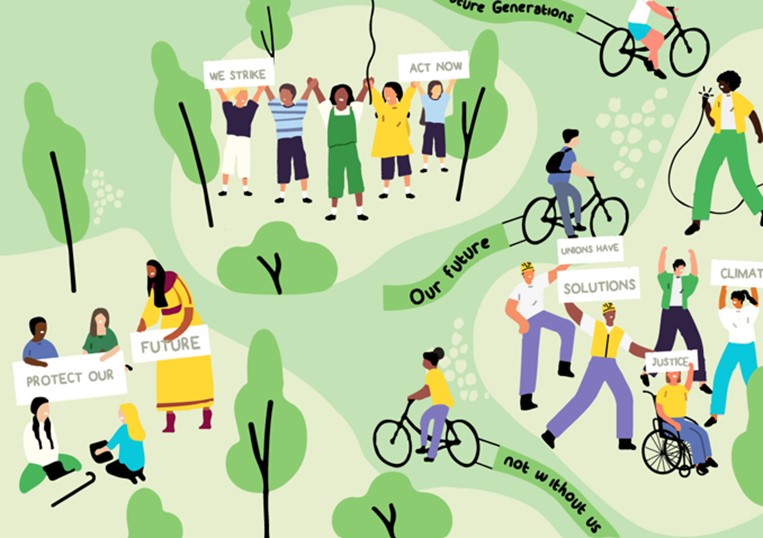
Oct 22, 2021
Climate justice activists are increasingly under attack across the globe by governments acting in concert with private interests, a trend that threatens civic freedoms for all, says the United Nation’s special rapporteur on the rights to freedom of peaceful assembly and association in a new report.

UN Special Rapporteur on the rights to freedom of assembly and of association Clément N. Voule
UN Special Rapporteur Clément N. Voule delivered the report to the UN General Assembly last week and then discussed its findings at a virtual side event October 15. At the event, Voule outlined the escalating threats to climate activists and their organizations, including criminalization of peaceful protests—the foundation of grassroots human rights advocacy campaigns. Of special concern, he said, are the use of state agencies and legislatures by private interests to impede or eliminate environmental defenders through physical attacks, intimidation, imprisonment and other judicial harassment, as well as restrictions on funding and travel to international climate justice venues.
More than 70 percent of human rights defenders killed each year are standing up for the environment, he said.
The report found a pattern of escalating threats that are undermining the effectiveness of environmental activists and their organizations worldwide, such as:
- Violence and intimidation
- The use of national security laws to surveil, charge or imprison environmental activists
- An increasing number of bans and restrictions against formerly legal protest methods, such as road blocking
- Ramped-up public smear campaigns that destroy activists’ reputations by painting them as extremists, foreign agents or terrorists
The report cited “powerful actors, including transnational fossil fuel, extractive, agribusiness and financial institutions,” that are pressuring governments to weaken their climate response and which “have supported parastatal organizations engaging in a variety of campaigns against climate justice activists, including online and direct violence.”
However, said Voule at the side event, “We must change the narrative. Environmental activists are not the enemy.”
The side event was led by Voule in cooperation with Earthrights International, European Center for Not-for-Profit Law (ECNL), Geneva Academy, Greenpeace International, International Center for Not-For-Profit Law (ICNL), International Service for Human Rights (ISHR) and the Solidarity Center. The event was moderated by Greenpeace International Legal Counsel Daniel Simon. Presenters included Permanent Mission of Costa Rica to the UN in New York Ambassador Rodrigo Carazo; Permanent Mission of Ireland to the UN in Geneva Ambassador Michael Gaffey; Earthrights International Climate Change Policy Adviser Natalia Gomez; First Nation Couchiching and U.S.-based Giniw Collective Founder Tara Houska; economist and Congress of South African Trade Unions (COSATU) Labor Market Policy Coordinator Lebogang Mulaisi and Secretary General’s Envoy on Youth Jayathma Wickramanayake.

COSATU Labor Market Policy Coordinator Lebogang Mulaisi
COSATU is joining the climate justice fight, said panelist Lebogang Mulaisi, because working people—especially those in the informal sector unfairly unprotected by labor laws and excluded from social safety nets—are the group most impacted by climate change. Unions are natural allies of defenders of community environmental rights because workers are from communities, she said.
“Climate justice is for everyone, and climate justice is now,” she said.
Unions will ally with the environmental justice movement to defend everyone’s rights, Mulaisi added, because they can only fight effectively for decent jobs while retaining the right to legally mobilize “mass social power” when negotiations at the conference table fail.
All states must ensure that all workers are guaranteed the right to associate, including the right to strike, and to bargain collectively at all levels, including over matters related to climate change and just transitions, recommends the report.
Unions Are Integral to the Climate Justice Movement
The report finds that unions are integral to states’ efforts to meet the objectives of the legally-binding Paris Agreement, which calls for states to “respect, promote and consider their respective obligations on human rights” and rights of indigenous peoples, as well as to take into account “the imperatives of a just transition of the workforce and the creation of decent work and quality jobs in accordance with nationally defined development priorities.”
Unions are helping states achieve these objectives by:
- Advocating for a just-transition agenda, which is a worker-led framework demanding a fair and democratic approach from governments that are shifting their economies to sustainable production—including application of a range of social interventions that are needed to secure worker rights and livelihoods
- Advancing a climate justice agenda and influencing employers at workplace, sectoral, national and international levels to transition to clean energy and address environmental degradation.
The effectiveness of workers and unions to drive inclusive climate solutions is being hampered by issues that must be addressed and resolved, including:
- Regular exclusion of unions and workers from critical climate discussions and policy design and planning, such as those associated with nationally determined contributions (NDCs) and job-loss mitigation projects developed under the Paris Agreement
- Through the exclusion of large swaths of workers from labor laws, barriers to those workers’ right to exercise freedom of association and peaceful assembly—with migrant workers and those employed in agricultural or informal sectors, or by foreign investors, being especially vulnerable.
Governments and employers must engage with workers and their organizations to develop climate and just transition policies, says the report because “[a]ddressing the climate crisis and ensuring a just transition require the existence of a vibrant and dynamic civil society.”










